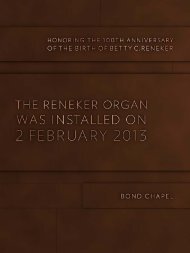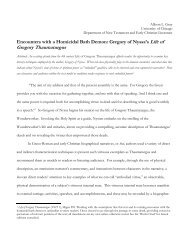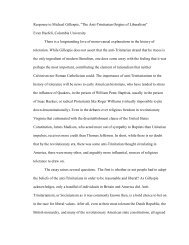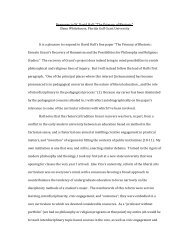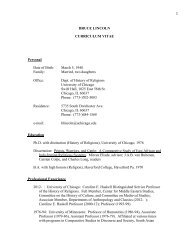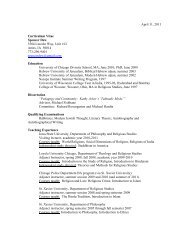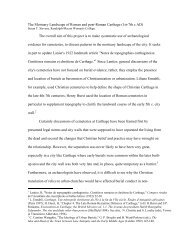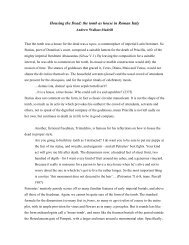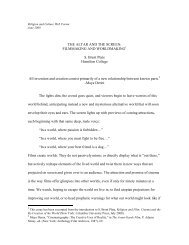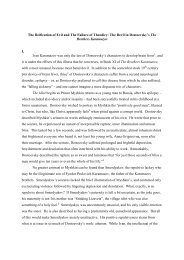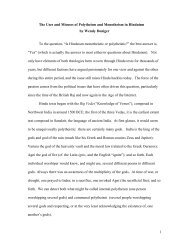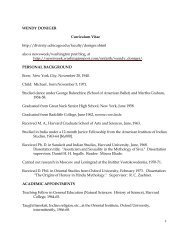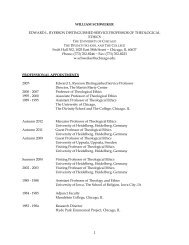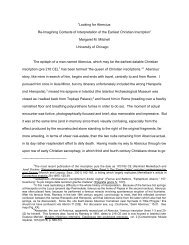*Criterion Winter 02-4.16 - Divinity School - University of Chicago
*Criterion Winter 02-4.16 - Divinity School - University of Chicago
*Criterion Winter 02-4.16 - Divinity School - University of Chicago
Create successful ePaper yourself
Turn your PDF publications into a flip-book with our unique Google optimized e-Paper software.
20 WINTER 20<strong>02</strong><br />
In sifting the rubble <strong>of</strong> Oscar Wilde and Lord Alfred Douglas<br />
rationality is a useless tool.<br />
And then methought outside a fast locked gate<br />
I mourned the loss <strong>of</strong> unrecorded words,<br />
Forgotten tales and mysteries half said,<br />
Wonders that might have been articulate,<br />
And voiceless thoughts like murdered singing birds.<br />
And so I woke and knew that he was dead. 20<br />
Douglas seems at last to have understood, if too late,<br />
the fundamental principles <strong>of</strong> forgiveness—that true reconciliation<br />
can only be affected by genuine contrition and<br />
reconciliation with the one wronged. That becomes clear<br />
in a sonnet transparently addressed to Oscar, entitled<br />
THE WASTES OF TIME<br />
If you came back, perhaps you would not find<br />
The old enchantment, nor again discern<br />
The altered face <strong>of</strong> love. The wheels yet turn<br />
That clocked the wasted hours, the spirit’s wind<br />
Still fans the embers in the hidden mind.<br />
But if I cried to you, ‘Return! return!’<br />
How could you come? How could you ever learn<br />
The old ways you have left so far behind?<br />
How sweetly, forged in sleep, come dreams that make<br />
Swift wings and ships that sail the estranging sea,<br />
Less roughly than blown rose leaves in a bowl,<br />
To harboured bliss. But oh! the pain to wake<br />
In empty night seeking what may not be<br />
Till the dead flesh set free the living soul. 21<br />
“Bosie had the most beautiful manners. I hope you will<br />
mention them,” wrote John Betjeman to Rupert Cr<strong>of</strong>t-<br />
Cooke when the latter was writing his biography <strong>of</strong> Douglas.<br />
Cr<strong>of</strong>t-Cooke concurred in this judgment <strong>of</strong> Bosie’s personality<br />
in maturity that “He was a splendid example <strong>of</strong> the<br />
truth <strong>of</strong> the tag that a gentleman is one who is never rude,<br />
except on purpose. He could be, in his earlier days particularly,<br />
most effectively rude, as his satires prove. But he could<br />
not be rude to the merely importunate, the tactless or the<br />
dull-witted.” 22<br />
It is a damnable assessment <strong>of</strong> a person to reduce a life to<br />
the judgment that he or she was, in the end, “nice.” That<br />
simplistic reduction is balanced by Aubrey Beardsley’s contemporary<br />
assessment <strong>of</strong> Oscar and Bosie that “both <strong>of</strong> them<br />
are really very dreadful people.” 23 All <strong>of</strong> which is only to say<br />
that Douglas and Wilde, like each <strong>of</strong> us, are complex.<br />
When I first set out to engage their stories I had in mind<br />
to revisit and reassess their biographies. I had a hunch that<br />
their life stories, like most, invite us to reflect upon our own<br />
lives. That is one reason why biography, self-inflicted or<br />
otherwise, remains the powerful genre that it is.<br />
What struck me about both Wilde and Douglas was a<br />
blindness that was, and still is, hard to plumb. Each man, at<br />
so many points, was blind to the effects <strong>of</strong> his actions upon<br />
himself, upon the other, upon all the others in their lives and<br />
societies. Each man was the product <strong>of</strong> complex family and<br />
social systems, yet each also possessed such strong will and<br />
sufficient ability as to dilute any excuse <strong>of</strong> victimization. Each<br />
man deeply wounded himself, the other, and all the others<br />
whom they touched; their wives and children were especially<br />
badly treated. Each was obviously capable <strong>of</strong> deep affection<br />
even for those they hurt. But the most difficult mystery was a<br />
pr<strong>of</strong>ound blindness to consequence. Each seemed genuinely<br />
surprised at his fate. Was it true innocence, naïveté, invincible<br />
ignorance? Was it egotistical selfishness, social privilege,<br />
intellectual arrogance? I don’t yet know.<br />
In sifting the rubble <strong>of</strong> Oscar Wilde and Lord Alfred<br />
Douglas rationality is a useless tool. Mystery defies reason. If<br />
their lives serve any use, it is perhaps as a morality tale for<br />
our own time. From the wreckage <strong>of</strong> their lives rise the first<br />
plaintive questions to ascend from the rubble <strong>of</strong> the World<br />
Trade Center and the Pentagon: Who could hate us so much,<br />
and why? How could so loving and generous a people as<br />
we are occasion such anger and suffer such loss? Having<br />
scratched around in the ruins <strong>of</strong> Wilde and Douglas, I know<br />
that even if we sift every ash in lower Manhattan, the mystery<br />
will remain. After all the clues are gathered, the evidence<br />
examined, the mystery will endure, the ancient mystery <strong>of</strong> sin.<br />
Try as we might, and try as we surely will, to deny it,<br />
excuse it, or justify it, ours is still a fallen world, and we with



